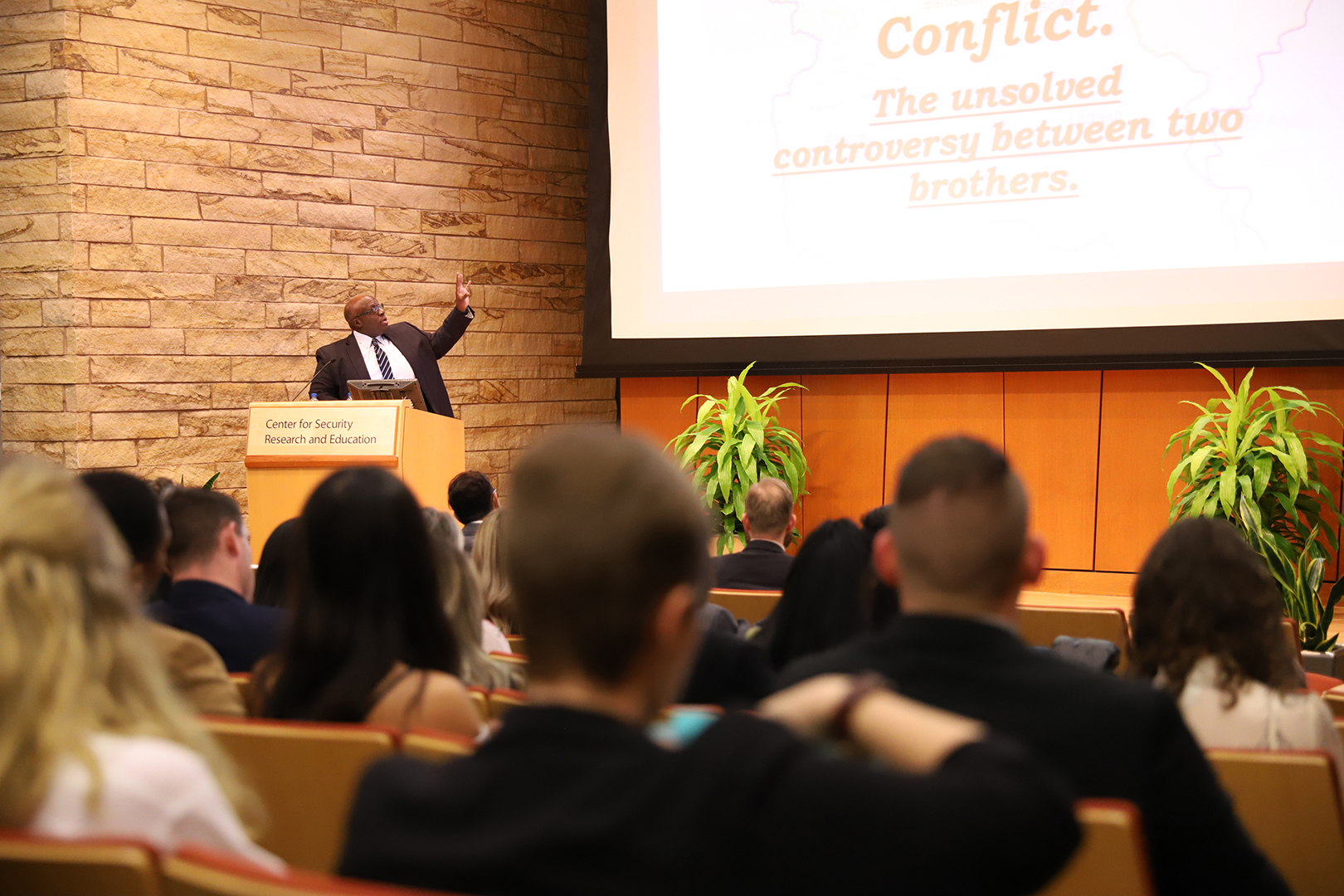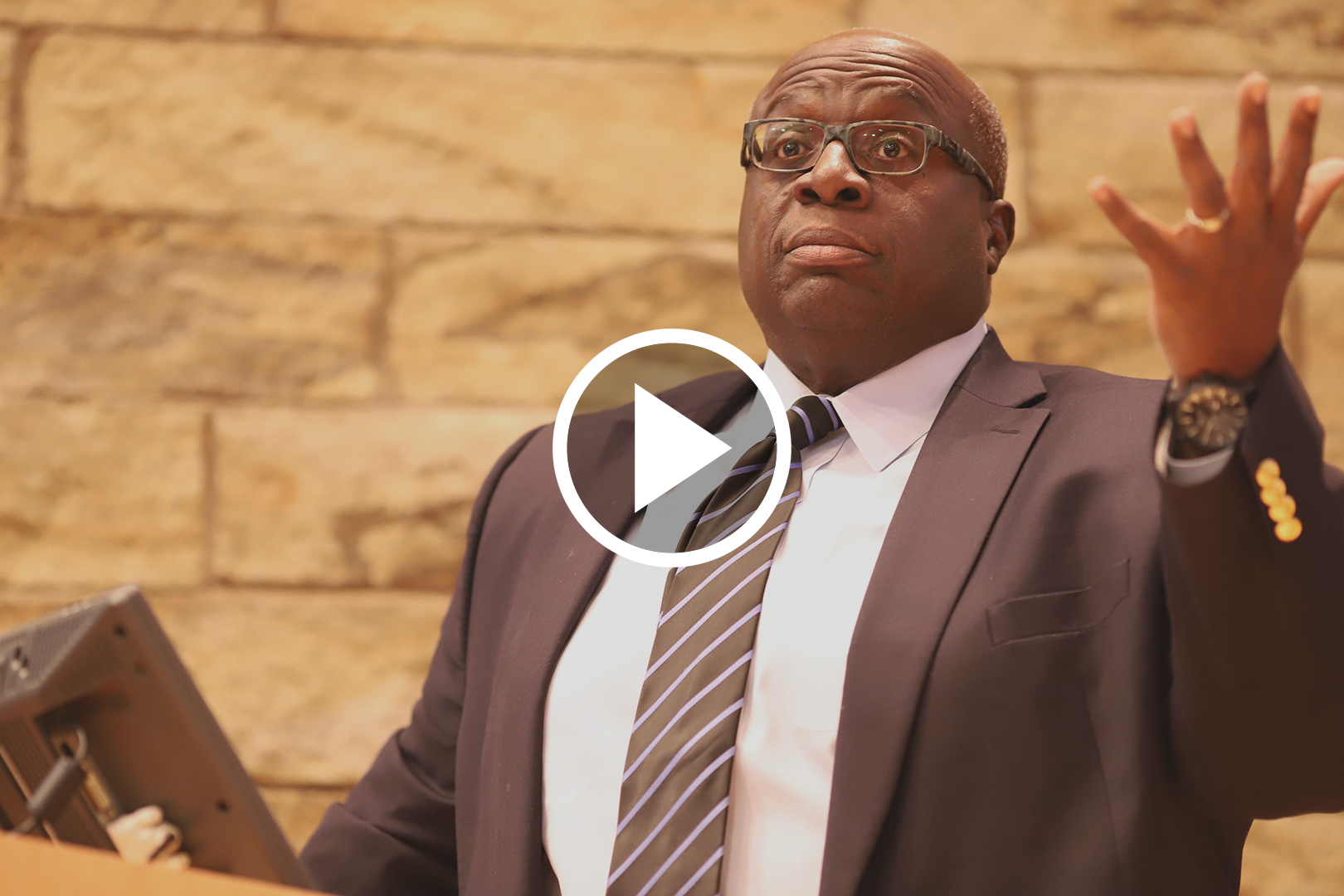UNIVERSITY PARK, Pa. – Ambassador Harry K. Thomas Jr. brought his considerable experience as a U.S. diplomat to the Lewis Katz Building on Friday, November 1, 2019, for a public lecture and discussion about the longstanding Kashmir crisis. His visit was sponsored by the Penn State Center for Security Research and Education (CSRE) in partnership with the Penn State School of International Affairs (SIA) and Center for Global Studies (CGS).
Ambassador Thomas is one of the United States’ most experienced diplomats, serving as ambassador to Zimbabwe (2016-2018), the Philippines (2010-2013), and Bangladesh (2003-2005). He also served as the State Department’s executive secretary and special assistant to Secretary of State Condoleezza Rice, director general of the Foreign Service and director of human resources, director of South Asia Affairs at the National Security Council, and director of the Operations Center. He retired in March 2018, following a 34-year Foreign Service career, with the rank of Career Minister. He is currently a Senior Fellow at Yale University’s Jackson Institute for Global Affairs, a private business consultant, and an international affairs lecturer.
“CSRE is proud to sponsor a speaker of Ambassador Thomas’ stature and experience,” said CSRE Director James W. Houck. “This is a great opportunity for our university community to directly engage with a deep expert and practitioner of U.S. foreign policy.”
The ambassador’s visit was timely, given that Kashmir has been in the news as tensions have escalated over the past few months. In August, India repealed Article 370 of its constitution, which had granted limited autonomy to the state of Jammu and Kashmir. In September, a bipartisan group of U.S. senators wrote a letter to President Trump urging him to step in to help resolve Kashmir’s worsening humanitarian crisis.
“Events at the School of International Affairs, such as the visit by someone as distinguished and accessible as Ambassador Harry Thomas’, provide SIA students and the Penn State community the opportunity to learn from and engage with some of the world’s top leaders and experts,” said SIA Director Scott Gartner, adding that the program is set to welcome another notable diplomat, Ambassador Karin Olofsdotter, on November 21. “The interactions and experiences our students have with these amazing people—there are over 100 SIA events each year—play a critical role in contributing to SIA students’ outstanding career success.”
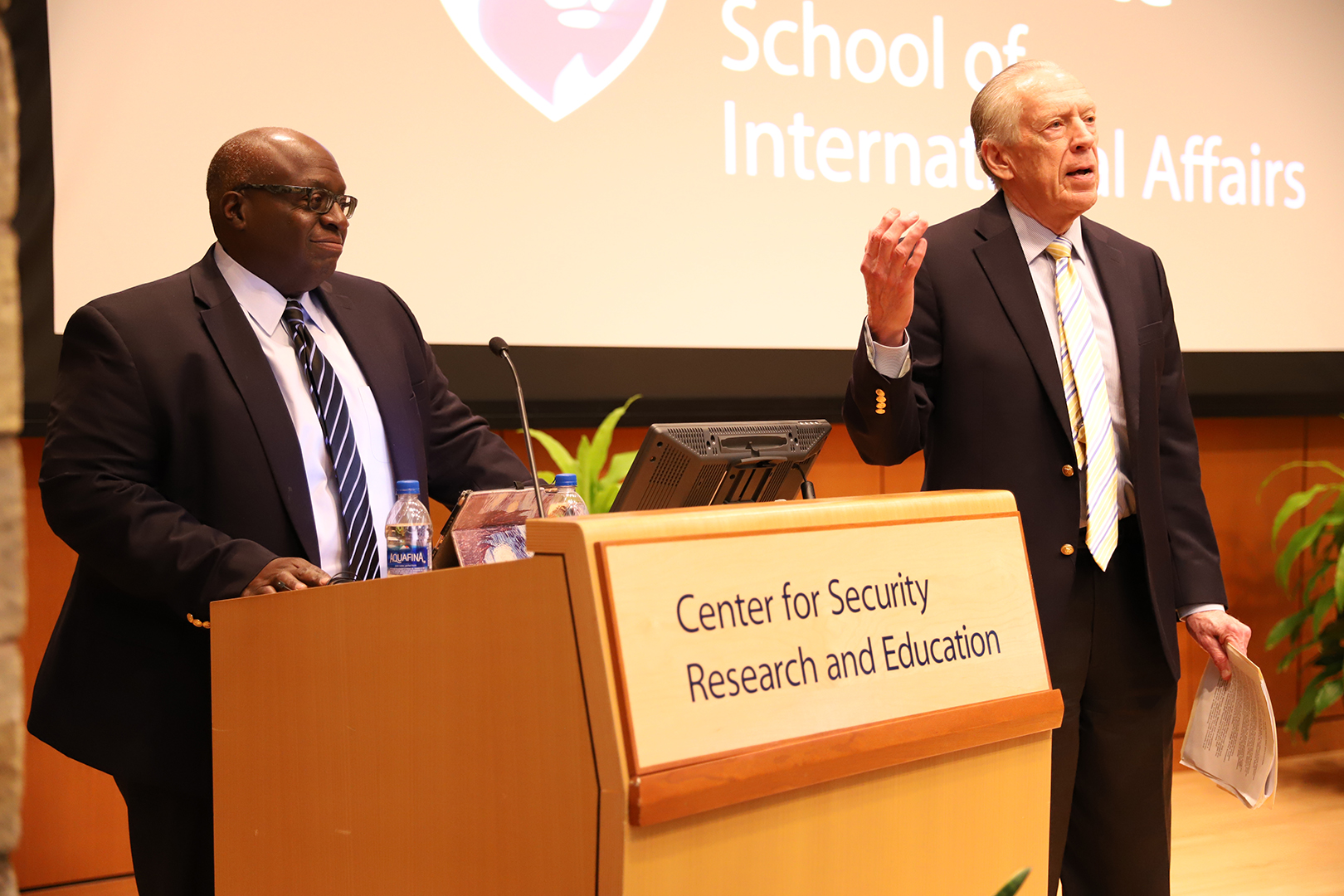
Ambassador Thomas was introduced by Ambassador Dennis Jett (right), professor of international affairs at SIA who worked with Thomas at the U.S. Department of State in 1992. IMAGE: Andrew Gabriel
Retracing the past 70 years of the dispute over Kashmir, Thomas focused his lecture on the U.S. government’s role as an intermediary in a geopolitical dispute that directly involves three countries—India, Pakistan, and China—as well as the Kashmiri people. He drew on his own experience in the region, including living in Kashmir in the mid-1990s while on a diplomatic mission to help secure the release of hostages, while highlighting the many challenges that arise from a complex, international dispute.
“When looking at the challenges and policy solutions, the Foreign Service leadership always taught us to understand the local environment, ask if the citizens’ needs were being met, and present attainable opportunity solutions that provide safety, security, opportunity, and alignment with the national government sovereignty. They stressed that military intervention buys you space but is rarely the final solution,” Thomas said.
A political misstep, however, might provoke India, Pakistan, or China—all of which are nuclear-armed states—and raise the threat of a wider and deadlier conflict.
“Should the global community ignore humanitarian challenges, ignore the aspirations of the Kashmiri people?” Thomas asked. “Or, would it cause conflict to listen to the Kashmiri people?”
Sometimes, he cautioned, maintaining a tenuous peace is the best a diplomat can hope for.
“What we do know is that absent social and economic improvement for the population, there will be no permanent peace and security in the valley or between India and Pakistan,” he said.
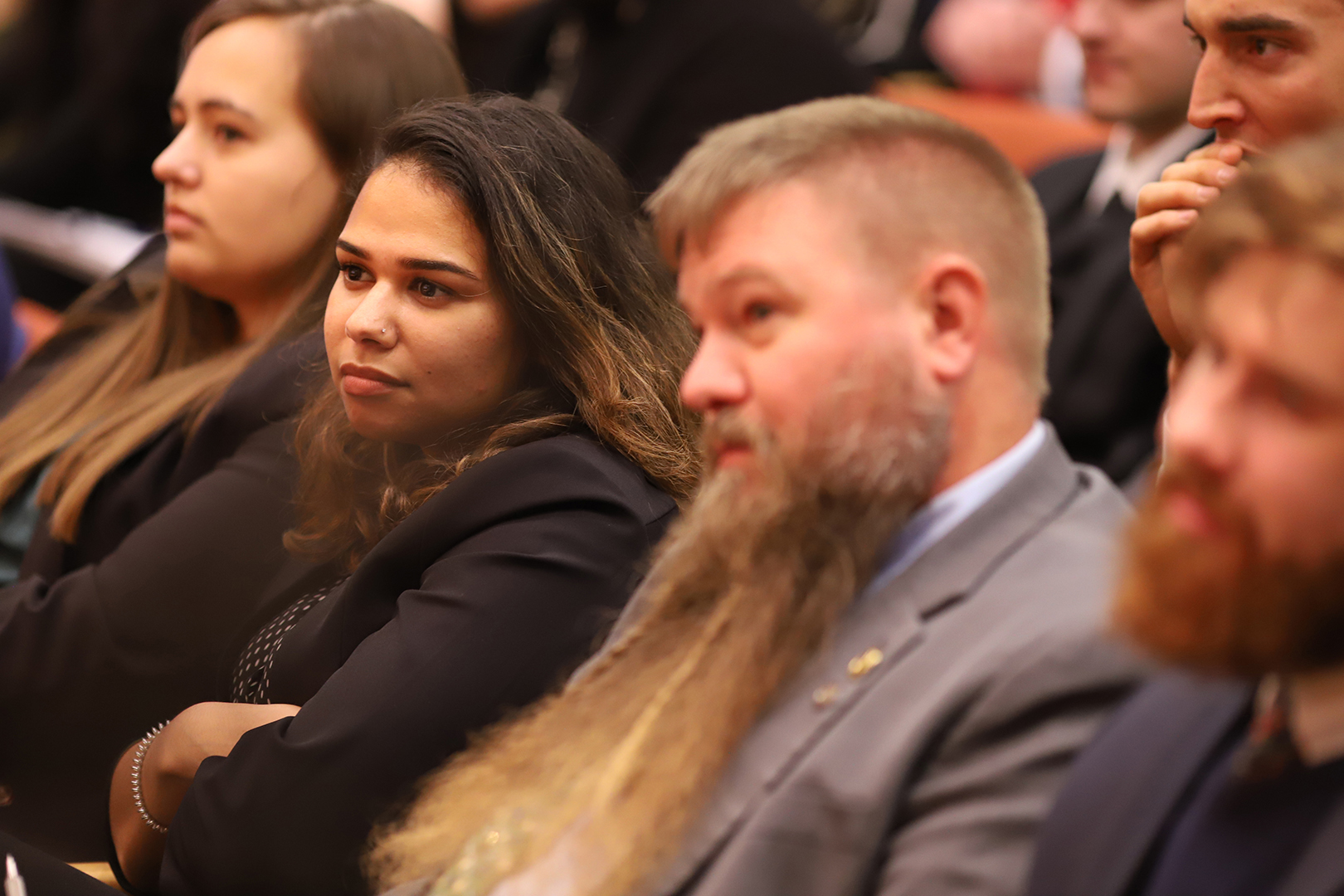
SIA students and others in the audience listen to Amb. Thomas discuss the Kashmir crisis. IMAGE: Andrew Gabriel
He also warned that the impact of regional conflicts often expands beyond its immediate confines and can affect global events in unexpected ways. He noted, for example, that some of the individuals involved in perpetuating violence in relation to the Kashmir crisis had connections to the Taliban and to the terrorists responsible for the 9/11 attacks.
“We missed all those signals. We failed to connect the dots. We did not learn the language or the culture until it was too late,” he said. “Then we thrashed out in Afghanistan and in Iraq in a manner that has not led to peace or democracy, and indeed, [has] strengthened those who are most at odds with our ideals.”
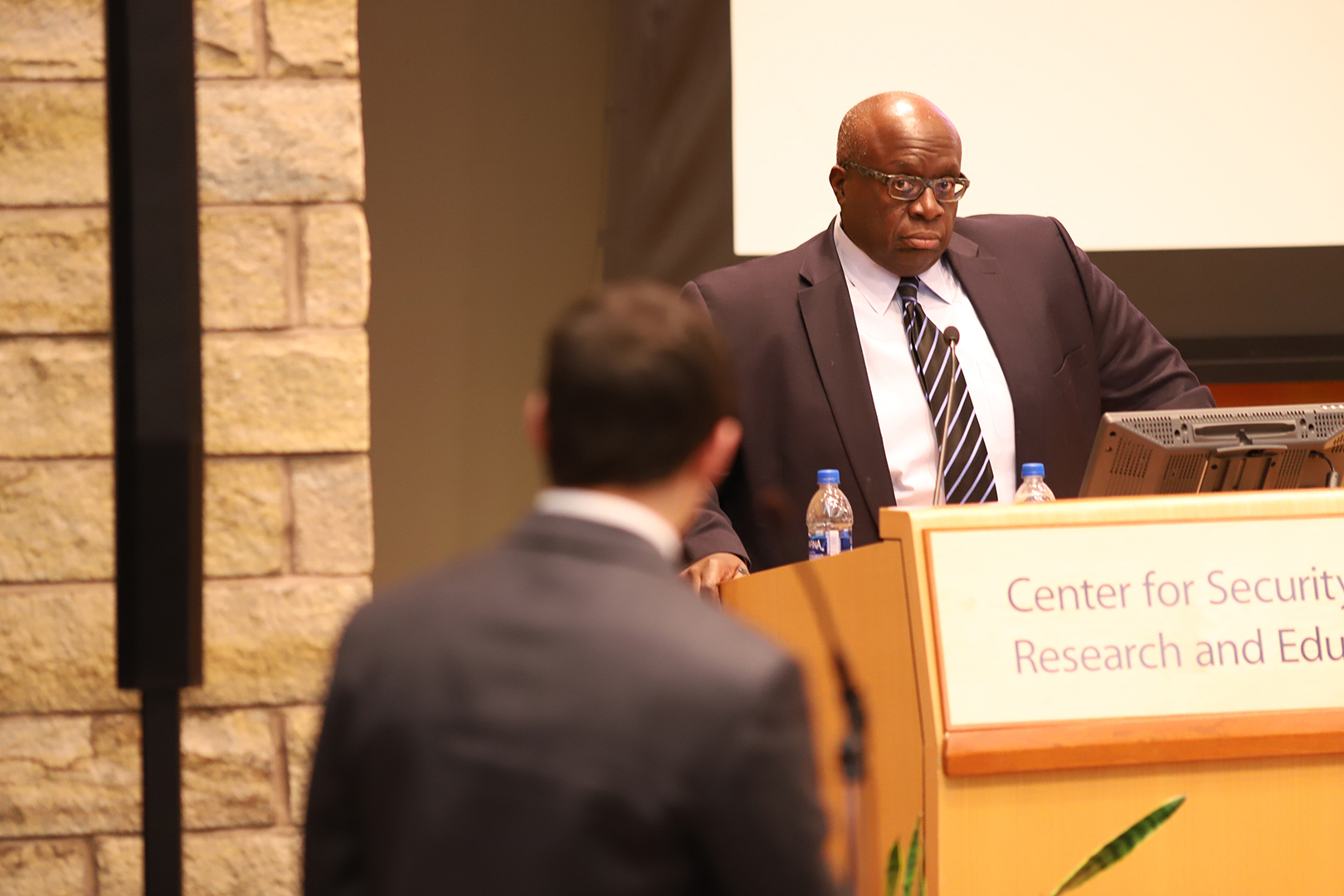
Ambassador Thomas fields a question from the audience following his lecture on Kashmir. IMAGE: Andrew Gabriel
At the conclusion of his lecture, Ambassador Thomas fielded questions from the audience for about 30 minutes. In addition to questions specifically about the Kashmir crisis, some students took advantage of the opportunity to glean additional insights from an experienced diplomat about careers in the Foreign Service.
One of the lessons he learned over the course of three decades at the State Department? The work of a diplomat never ends, even when public attention has moved on to the next crisis.
“A few years ago we had ‘save our girls’ was a hashtag—Boko Haram. Those girls, about 170 of those girls are still under captivity,” Thomas said. “Is there a hashtag for that today? So how are you going to get young people, how are you going to get the global community, how are you going to get countries interested in something that—they [only want to] deal with it when it’s a crisis.”
Though the world’s eyes may move on to the next conflict du jour, when it comes to Kashmir and the prospects of a diplomatic solution, the end is not in sight.
“Some issues must be managed to avoid miscalculation and nuclear war,” Thomas concluded, “but I would say the violence has not abated and we are no closer to permanent peace in Kashmir today than we were in 1949 or 1965.”

